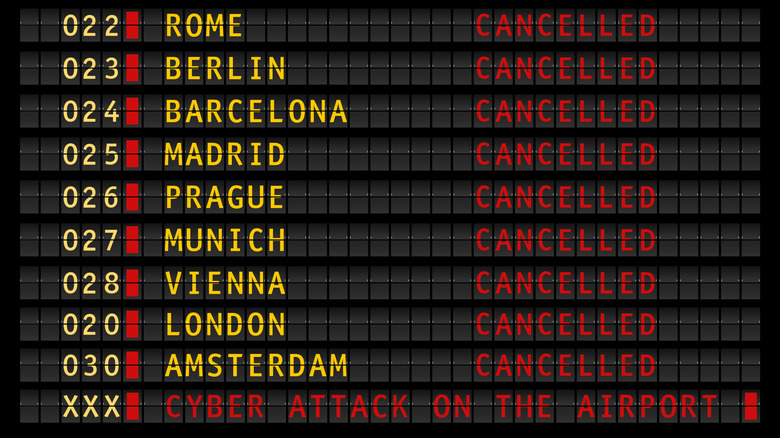What Happens When An Airport Gets Cyberattacked? Here's What Travelers Should Know
Fewer things in life are more stressful than being hacked having your identity stolen. What information was compromised? Is it being sold to someone else? Is it being used to throw you into spiraling debt? The stress is unimaginable. Now imagine an international airport's digital systems being hacked. This was the reality for many international European airports this past weekend, so what happens when this happens and what do travelers need to know?
Just a few days ago, major European airports in London, Brussels, and Berlin saw grounded flights, frustrated travelers, and the authorities were left scratching their heads. A massive cyberattack that struck their digital automated check-in and boarding systems, which are run by Collins Aerospace and owned by RTX, a defense system, resulted in thousands of passengers having to check in manually, which caused more headaches for travelers and airport staff as well.
Confirmed reports by the European Union Agency for Cybersecurity say that it was a malware software hack, which just goes to show you why you may want to think twice about using public Wi-Fi when traveling. With more of our personal and biometric data being implemented for travel, such as the new European Entry/Exit System (EES) slated to begin October 2025, it makes one wonder: Is our data safe and is this a good idea?
Cyberattack paralyzes major European airports stranding thousands and causing havoc
Travel Correspondent, Simon Calder told the Independent U.K. that there were delays, cancelations, and plenty of issues such as missed connecting flights stemming from the cyberattack. While travelers want to know how to figure out how much money airlines owe them when their flight is canceled, many are asking how this happened in the first place and who is responsible.
Collins Aerospace said on Monday, September 22, that it was working on getting everything back online and is tight-lipped as to who could potentially be behind the cyberattack. Without pointing fingers, it said that due to the growing risks within the digital infrastructure, this will not be the last the public sees of outages affecting European airports. One traveler chimed in by saying that it reminded them of early travel days when boarding passes had to be written out by hand.
As of Monday, Berlin's airport was still experiencing issues causing delays, while Dublin's airport didn't see any specific issues, but was still completing some tasks manually rather than digitally. Out of nearly 550 flights arriving and departing to and from Brussels on Monday, over 60 had to be canceled due to the disruption.
With more of our personal data going digital, what travelers need to be aware of
Another impact that airports are going to need to address are refunds for those passengers that have missed flights. When airports go through these sorts of issues, it's always best to check to see if your flight will be canceled or delayed by showing up for your flight as early as possible if you aren't notified otherwise. Collins Aerospace is not immune to a potential court case from the economic and safety breach that has happened throughout this matter as well.
Travelers may worry if their private data has also now been leaked in the cyberattack, which has not been made clear as of yet. It raises the question: Is convenience worth your privacy and online safety? With the EES system coming into play shortly, biometric data will need to be provided for entry into Europe (for non EU members and citizens), which will collect fingerprints, as well as a picture of you.
With the recent cyberattack on major airports, what does this potentially mean for passengers? Could identity theft resulting in fraud caused by manipulated fingerprints, iris scans, or more be in our future? What about privacy violations that can track your data and sell it to third parties? Unlike credit card theft, once biometric data is stolen, you cannot replace it, so airports, as well as governments, should start to treat digital safety like physical safety when it comes to travelers.


